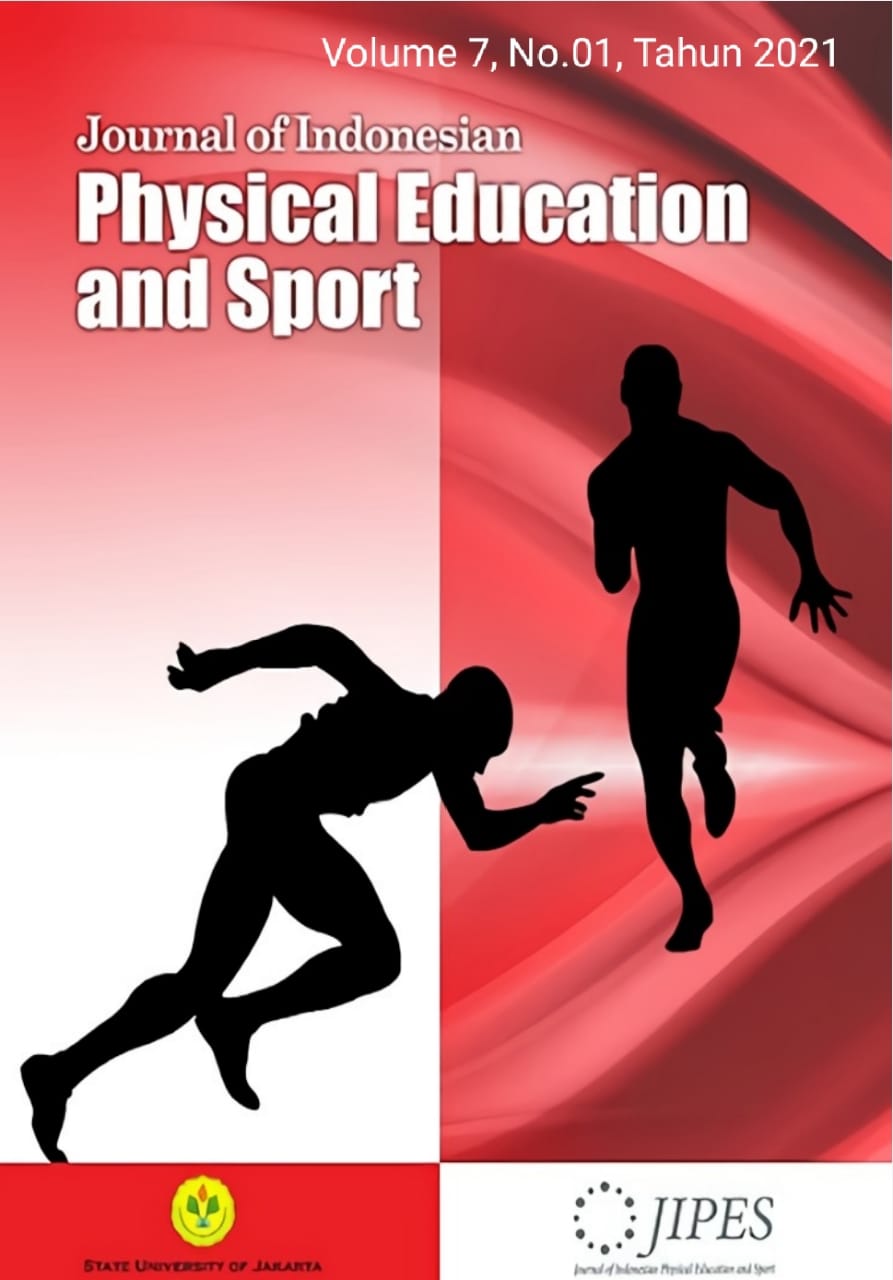THE EFFECTIVENESS OF CONTEXTUAL-BASED YOGA LEARNING MODEL ON STUDENT CHARACTER
The Effectiveness of Contextual-Based Yoga Learning Model on Student Character
Keywords:
yoga, kontekstual, PYBK, KarakterAbstract
Low fitness is a projection of low movement skills and student learning energy so that it is possible to experience a decrease in mastery of the values of each subject. This study was to analyze the effectiveness of the contextual-based yoga learning model (PYBK) on the character of the VIII grade junior high school students. This study used a quantitative research design with the type of research, namely experimental with this research design following the basic pattern of experimental design with the design of the Post Test Only Control Group Design to determine the character of the students. This research was conducted in junior high schools with a population of 144 students divided into 5 classes. The research sample was taken by random sampling technique so that two classes were determined to be the sample of this study. Class A with 27 students as the control group and class D with 30 students as the experimental group. The method used to collect data in this study is non-test. The data analysis used is descriptive and inferential. The data obtained were analyzed using the prerequisite test and t test for different samples using the help of the SPSS 25.0 for Windows program. The results of the hypothesis testing conducted showed the significance level of the Character count of 0,000. This result is smaller than the significance (α) 0.05. This means that there is a significant difference between students who were taught with the contextual-based Yoga learning model (PYBK) and students who were not taught with contextual-based Yoga learning models, after learning PJOK with the PYBK model.
References
Aminudin, B. (2016). Pengaruh Pola Asuh Otoritatif Terhadap Kecerdasan Interpersonal Siswa Kelas V SD. Jurnal Pendidikan Guru Sekolah Dasar, 25(5), 11, 26, 83. https://eprints.uny.ac.id/37886/ (Diakses 30 Januari 2019 Pukul 22:50 WIB)
Andhini, N. F. (2017). Pengaruh Pergaulan Teman Sebaya Terhadap Pembentukan Karakter Siswa Kelas VIII Mts Negeri 3 Kabupaten Tangerang. Journal of Chemical Information and Modeling, 53(9), 1689–1699. https://doi.org/https://doi.org/10.33853/jm2pi.v1i1.70
Ansori, Y. Z. (2020). Pembinaan Karakter Siswa Melalui Pembelajaran Terpadu Di Sekolah Dasar. Jurnal Educatio FKIP UNMA, 6(1), 177–186. https://ejournal.unma.ac.id/index.php/educatio/article/download/308/202/
Basri, B., & Dwiningrum, N. R. (2020). Peran Ormawa dalam Membentuk Nilai-nilai Karakter di Dunia Industri (Studi Organisasi Kemahasiswaan di Politeknik Negeri Balikpapan). Al-Adabiya: Jurnal Kebudayaan Dan Keagamaan, 15(01), 139–160. https://doi.org/10.37680/adabiya.v15i01.273
Cheung, C. kiu, & Lee, T. yan. (2010). Improving social competence through character education. Evaluation and Program Planning, 33(3), 255–263. https://doi.org/10.1016/j.evalprogplan.2009.08.006
Darmawan, I. (2017). Upaya Meningkatkan Kebugaran Jasmani Siswa Melalui Pendidikan Jasmani. JIP, 7(2), 143–154. http://ejournal.unikama.ac.id/index.php/jrnspirasi/article/download/1700/1465
Dirgantoro, K. P. S. (2018). Kompetensi Guru Matematika Dalam Mengembangkan Kompetensi Matematis Siswa. Scholaria: Jurnal Pendidikan Dan Kebudayaan, 8(2), 157–166. https://doi.org/10.24246/j.js.2018.v8.i2.p157-166
Fahmy, R., Bachtiar, N., Rahim, R., & Malik, M. (2015). Measuring Student Perceptions to Personal Characters Building in Education: An Indonesian Case in Implementing New Curriculum in High School. Procedia - Social and Behavioral Sciences, 211, 851–858. https://doi.org/10.1016/j.sbspro.2015.11.112
Fitriani, F., Jamal, M. A., & Wati, M. (2013). Meningkatkan Hasil Belajar Siswa Melalui Model Generatif Learning Dengan Pendekatan Kontekstual. Berkala Ilmiah Pendidikan Fisika, 1(1), 47. https://doi.org/10.20527/bipf.v1i1.860
Gunarta, I. K. (2017). Implementasi Pembelajaran Yoga Dalam Meningkatkan Konsentrasi Belajar Di Sekolah Dasar Negeri 1 Sumerta. Jurnal Penjaminan Mutu, 3(2), 180. https://doi.org/10.25078/jpm.v3i2.198
Helaludin. (2019). Peningkatan Kemampuan Literasi Teknologi dalam Upaya Mengembangkan Inovasi Pendidikan di Perguruan Tinggi. Pendais, I(skor 403), 44–55. https://uit.e-journal.id/JPAIs/article/download/218/366/
Mahardita, G. A. M. C., Abadi, I. B. G. S., & Putra, M. (2017). Pengaruh Pendekatan Pembelajaran Kontekstual Berbantuan Media Visual Terhadap Hasil Belajar IPA Siswa Kelas V. E-Journal PGSD Universitas Pendidikan Ganesha Mimbar PGSD, 5(2), 1–9. https://doi.org/http://dx.doi.org/10.23887/jjpgsd.v5i2.10809
Mar, A., Hasanah, A., & Saraswati, S. (2015). Pengaruh Perilaku Teman Sebaya Terhadap Asertivitas Siswa. Indonesian Journal of Guidance and Counseling: Theory and Application, 4(1), 22–29. https://doi.org/https://doi.org/10.15294/ijgc.v2i3.3195
Mei-Ju, C., Chen-Hsin, Y., & Pin-Chen, H. (2014). The Beauty of Character Education on Preschool Children’s Parent-child Relationship. Procedia - Social and Behavioral Sciences, 143, 527–533. https://doi.org/10.1016/j.sbspro.2014.07.431
Negara, P. A., & Latifah, L. (2015). Pengaruh Peranan Keluarga, Interaksi Teman Sebaya, Dan Kompetensi Guru Terhadap Karakter Siswa Kelas Xi Ips Dalam Pembelajaran Ekonomi Di Sma 2 Kudus. Economic Education Analysis Journal, 4(1), 203–210. http://journal.unnes.ac.id/sju/index.php/eeaj/article/view/4698/4335
Putra, F. G. (2017). Eksperimentasi Pendekatan Kontekstual Berbantuan Hands On Activity (HoA) Terhadap Kemampuan Pemecahan Masalah Matematik. Al-Jabar : Jurnal Pendidikan Matematika, 8(1), 73. https://doi.org/10.24042/ajpm.v8i1.1148
Sariningsih, R. (2014). Pendekatan Kontekstual Untuk Meningkatkan Kemampuan Pemahaman Matematis Siswa Smp. Infinity Journal, 3(2), 150. https://doi.org/10.22460/infinity.v3i2.60
Suheli. (2018). Manajemen Peserta Didik Berbasis Pesantren dalam Pembentukan Karakter. Jurnal Kependidikan, 6(2), 207–221. https://doi.org/https://doi.org/10.24090/jk.v6i2.2258
Suriadi. (2018). Pendekatan Kontekstual dalam Pembelajaran Fiqih (Studi di MIN Sekuduk, Kecamatan Sejangkung, Kabupaten Sambas). Muallimuna : Jurnal Madrasah Ibtidaiyah, 3(1), 1–11. https://ojs.uniska-bjm.ac.id/index.php/jurnalmuallimuna/article/view/951
Ulya, I. F., & Irawati, R. (2016). Peningkatan Kemampuan Koneksi Matematis Dan Motivasi Belajar Siswa Menggunakan Pendekatan Kontekstual. Jurnal Pena Ilmiah, 1(1), 121–130. https://doi.org/10.23819/pi.v1i1.2940
Utomo, C. B., & Muntholib, A. (2018). Implementasi Pendidikan Karakter dalam Membentuk Sikap dan Perilaku Sosial Peserta Didik Melalui Pembelajaran Sejarah di SMA PGRI 1 Pati Tahun Pelajaran 2017/2018. Indonesian Journal of History Education, 6(1), 1–13. https://journal.unnes.ac.id/sju/index.php/ijhe/article/view/27332
Wirmayani, P., & Supriyadi. (2018). Pengaruh Yoga Terhadap Kemampuan Konsentrasi Belajar Anak Sd Negeri Di Denpasar. Jurnal Psikologi Udayana, 4(02), 460. https://doi.org/10.24843/jpu.2017.v04.i02.p20
Yanti, Y., & Marimin. (2017). Pengaruh Motivasi, Lingkungan Keluarga, Dan Teman Sebaya Terhadap Kedisiplinan Siswa. Economic Education Analysis Journal, 6(2), 329–338.
Yoda, I. K., Sudiana, I. K., & Peling, S. W. Y. (2015). Evaluasi Program Pelatihan Kondisi FIsik Atlet Buleleng pada Porprov Bali XII Tahun 2015. 3(2), 54–67. https://ejournal.undiksha.ac.id/index.php/PENJAKORA/article/download/11665/7472










 </a > a
</a > a 